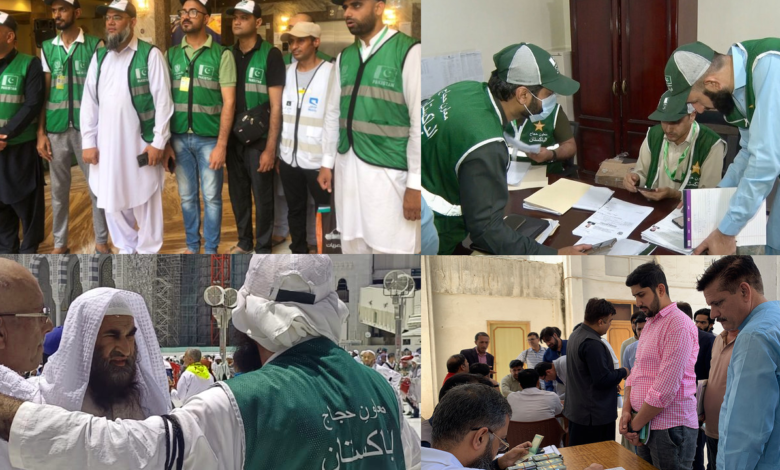Moavineen-e-Hujjaj: Responsibilities, Eligibility and Selection Criteria
In this comprehensive article, we will explore who the Moavineen-e-Hujjaj are, their responsibilities, eligibility criteria, and the selection process.

The annual Hajj pilgrimage is one of the most significant events in the Islamic calendar, drawing millions of Muslims from around the world to the holy cities of Mecca and Medina. Ensuring the smooth execution of this massive gathering requires meticulous planning, coordination, and support. This is where Moavineen-e-Hujjaj play a crucial role.
In this comprehensive article, we will explore who the Moavineen-e-Hujjaj are, their responsibilities, eligibility criteria, and the selection process. By the end, you will have a clear understanding of their vital role in facilitating the Hajj pilgrimage.
Who Are Moavineen-e-Hujjaj?
The term Moavineen-e-Hujjaj translates to “Assistants of Pilgrims” in English. They are a group of dedicated individuals appointed by the government of Pakistan (and other countries with significant Muslim populations) to assist and support Hajj pilgrims during their journey. Their primary goal is to ensure that pilgrims can perform their religious duties with ease, comfort, and peace of mind.
Moavineen-e-Hujjaj are typically government employees, volunteers, or individuals hired specifically for the Hajj season. They work under the supervision of the Ministry of Religious Affairs and Interfaith Harmony in Pakistan and are deployed to Saudi Arabia to assist pilgrims throughout their stay.

Responsibilities of Moavineen-e-Hujjaj
The role of Moavineen-e-Hujjaj is multifaceted and requires a high level of dedication, patience, and organizational skills. Their responsibilities can be broadly categorized into the following areas:
1. Pre-Hajj Preparation
- Registration and Documentation: Assisting pilgrims with the registration process, verifying documents, and ensuring all necessary paperwork is completed.
- Orientation Sessions: Conducting pre-Hajj training sessions to educate pilgrims about the rituals, rules, and regulations of Hajj.
- Logistical Support: Coordinating travel arrangements, accommodation, and transportation for pilgrims.
2. On-Ground Assistance in Saudi Arabia
- Airport Assistance: Helping pilgrims navigate airports, manage luggage, and complete immigration and customs procedures.
- Accommodation Management: Ensuring pilgrims are comfortably settled in their accommodations in Mecca and Medina.
- Transportation Coordination: Arranging buses and other transportation for pilgrims to travel between holy sites.
- Medical Support: Assisting pilgrims with medical needs, including coordinating with healthcare providers and ensuring access to medical facilities.
- Guidance During Rituals: Providing guidance and support during the performance of Hajj rituals, such as Tawaf, Sa’i, and Wuquf at Arafat.
3. Crisis Management
- Handling Emergencies: Responding to emergencies such as lost pilgrims, health issues, or other unforeseen circumstances.
- Conflict Resolution: Mediating disputes or misunderstandings among pilgrims or between pilgrims and service providers.
- Communication: Acting as a liaison between pilgrims and the Hajj mission, as well as local authorities in Saudi Arabia.
4. Post-Hajj Support
- Return Travel Assistance: Helping pilgrims with departure procedures, including luggage handling and airport formalities.
- Feedback Collection: Gathering feedback from pilgrims to improve the Hajj experience in future years.
- Reporting: Submitting detailed reports to the Hajj mission about the overall experience, challenges faced, and recommendations for improvement.
Eligibility Criteria for Moavineen-e-Hujjaj

Becoming a Moavineen-e-Hujjaj is a prestigious opportunity, but it comes with strict eligibility criteria to ensure that only the most qualified individuals are selected. The criteria may vary slightly depending on the country, but the following are the general requirements:
1. Nationality and Residency
- Applicants must be citizens of the country they are representing (e.g., Pakistani citizens for Pakistan’s Hajj mission).
- They should have a valid national identity card or passport.
2. Age Limit
- Typically, applicants must be between 25 and 45 years old. This ensures that individuals are mature enough to handle responsibilities while being physically capable of performing demanding tasks.
3. Educational Qualifications
- A minimum of a bachelor’s degree is usually required. Preference is often given to candidates with higher qualifications or specialized training in relevant fields such as healthcare, administration, or religious studies.
4. Language Proficiency
- Fluency in Arabic is highly desirable, as it facilitates communication with local authorities and service providers in Saudi Arabia.
- Proficiency in English and the native language of the pilgrims (e.g., Urdu for Pakistani pilgrims) is also essential.
5. Experience and Skills
- Prior experience in customer service, event management, or healthcare is advantageous.
- Strong organizational, communication, and problem-solving skills are critical.
- Knowledge of Hajj rituals and Islamic teachings is a must.
6. Health and Fitness
- Applicants must be in good physical and mental health to handle the demanding nature of the job.
- A medical certificate may be required to confirm fitness for duty.
7. Character and Conduct
- Applicants must have a clean criminal record and demonstrate high moral character.
- They should be known for their patience, empathy, and ability to work under pressure.
Selection Criteria for Moavineen-e-Hujjaj
The selection process for Moavineen-e-Hujjaj is rigorous and designed to identify the most capable and dedicated individuals. The process typically involves the following steps:
1. Application Submission
- Interested candidates must submit an application form and required documents such as educational certificates, CNIC, and a recent photograph.
- The application period is usually announced through official government channels and newspapers.
2. Written Test
- Candidates are required to take a written test to assess their knowledge of Hajj rituals, Islamic teachings, and general awareness.
- The test may also include questions to evaluate problem-solving and communication skills.
3. Interview
- Shortlisted candidates are called for an interview, where they are assessed on their communication skills, attitude, and suitability for the role.
- The interview panel may include officials from the Ministry of Religious Affairs and other relevant departments.
4. Training Program
- Selected candidates undergo a comprehensive training program that covers Hajj rituals, crisis management, communication skills, and cultural sensitivity.
- The training may include both theoretical and practical components.
5. Final Selection
- After completing the training program, candidates are evaluated based on their performance and suitability.
- The final list of Moavineen-e-Hujjaj is announced, and selected individuals are assigned specific roles and responsibilities.
Challenges Faced by Moavineen-e-Hujjaj
While the role of Moavineen-e-Hujjaj is highly rewarding, it is not without its challenges. Some of the common challenges include:
1. Language Barriers
- Communicating with pilgrims from diverse linguistic backgrounds can be challenging, especially when dealing with elderly or less-educated individuals.
2. Logistical Issues
- Managing the logistics of thousands of pilgrims, including transportation, accommodation, and food, requires exceptional organizational skills.
3. Health Concerns
- The physical and emotional toll of assisting pilgrims, often in extreme weather conditions, can be exhausting.
4. Cultural Differences
- Navigating cultural differences and ensuring that all pilgrims feel respected and supported can be challenging.
5. Emergency Situations
- Handling emergencies such as lost pilgrims, medical crises, or natural disasters requires quick thinking and effective coordination.
The Impact of Moavineen-e-Hujjaj
The work of Moavineen-e-Hujjaj has a profound impact on the Hajj experience for pilgrims. By providing essential support and guidance, they help ensure that pilgrims can focus on their spiritual journey without unnecessary stress or inconvenience. Their dedication and hard work contribute to the overall success of the Hajj mission and reflect positively on their country.
Conclusion
Moavineen-e-Hujjaj are the unsung heroes of the Hajj pilgrimage, playing a vital role in ensuring that millions of pilgrims can perform their religious duties with ease and comfort. Their responsibilities are vast and demanding, requiring a unique combination of skills, knowledge, and dedication.
If you aspire to become a Moavineen-e-Hujjaj, it is essential to meet the eligibility criteria, excel in the selection process, and prepare yourself for the challenges ahead. By doing so, you can contribute to this noble cause and make a lasting impact on the lives of countless pilgrims.
The role of Moavineen-e-Hujjaj is not just a job; it is a service to humanity and a means of earning spiritual rewards. For those who are selected, it is an opportunity to be part of a sacred tradition and to play a role in one of the most significant events in the Islamic world.











